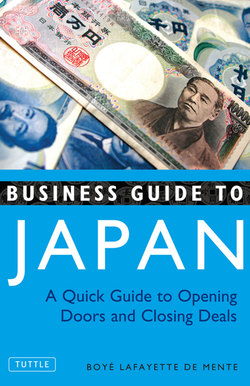Читать книгу Business Guide to Japan - Boye Lafayette De Mente - Страница 17
На сайте Литреса книга снята с продажи.
ОглавлениеPUTTING YOUR BEST FACE FORWARD
IN THE JAPANESE context there is no neat separation between business and personal life. The larger the company, the more apt it is to play a vital role in all the key areas of the lives of its employees—from housing and education to recreation.
Until the late 1990s larger Japanese companies did not hire to fill specific slots; they hired “recruits” (like military draftees) who received general orientation and then were assigned to departments where they received on-the-job training. Those hired as white-collar workers, particularly managerial candidates, were regularly rotated among departments to give them a broad perspective of the company and its operation. Regular employment for men was presumed to be for life.
Domestic and international competition has dramatically changed the way larger companies hire, train, and use their employees. Lifetime employment is no longer guaranteed. People who have worked in other companies and gained valuable skills are now sought after by virtually every major company in Japan—something that was unthinkable until the 1990s. Prior to this, only neophytes right out of high school or university were hired.
Japanese employers traditionally expected total loyalty, total conformity to company policy and culture, and a dedication to work and the welfare of the company that transcended personal concerns.
Given this paternalistic approach to personnel management, Japanese companies gave a high priority to character and personality in their hiring practices. They also gave substantial credence to the ranking of the schools potential employees attended and to their family backgrounds. With some specific exceptions in technical areas, any previous work experience, special knowledge, or aggressive ambition an applicant may have had was generally considered a negative instead of a plus (because these might hinder his being molded into a company man).
The traditional mind-set and practices among older, larger firms have not disappeared from the Japanese scene. But there are cracks in their monolithic policies and practices, as they are being forced to keep up with the times.
Not surprisingly, however, when these Japanese companies are approached by representatives of foreign companies, they tend to use the traditional yardsticks that continue to survive in their own firms to evaluate foreign managers and employees. The evaluation begins with the perceived image of the foreign company—whatever it is—and then jumps immediately to the representatives of that firm—their age, their title, how long they have been with the company, their educational background, any previous relationship with Japan, any personal Japanese contacts they may have, what they know about Japan, what their attitude is toward Japan, how they rank in their own company, why the foreign company chose to approach them (of all the other companies in Japan), who introduced them, and so on … all personal factors that they want to know before entering into serious discussions with anyone about anything.
The foreigner wanting to do business with the Japanese should anticipate this kind and degree of interest on the personal level and should do everything possible to present the most acceptable image. This means the foreign front man should be selected on the basis of criteria known to be acceptable—and generally speaking, the more impressive the better.
Here is a list of qualifications that are ideal for the foreigner who is going to be assigned to Japan (and are equally applicable to the foreigner visiting Japan in search of a Japanese partner or connection):
1. Since the man (or woman) will have to deal with Japanese managers who are in their late 40s and 50s, or older, he or she should be at least in his or her 30s or 40s.
2. The individual should have a calm, patient personality, be able to think logically and rationally and express himself clearly. If the individual has highly honed intuitive powers, so much the better. He should be secure in his own knowledge and ability and persistent in working toward the company goals.
3. He should have the full confidence and trust of top management back home and have both his responsibilities and authority clearly spelled out. If he does not have decisionmaking power, he should be guaranteed that when he asks the head office to make a decision, it will be forthcoming in a matter of hours or days. (Most foreign managers in Japan say they have as much or more trouble getting decisions and action out of their home offices as they do in dealing with the Japanese!)
4. The more experience the individual has already had with Japan and the more he knows about Japan, the better—if he is able to use this experience and knowledge in a nonthreatening, cooperative way that reassures the Japanese rather than turns them off. This includes an outgoing, friendly personality, and—this is very important—liking the Japanese well enough to enjoy their company. It helps if he is a modest drinker and likes a night out on the town (at least once a month). Having a finely honed, but not vulgar, sense of humor is also a major asset.
5. At the same time, the individual should not be naive or gullible, and should at all times insist on the philosophy of fairness and the policy of reciprocity.
6. The individual should have pride in his own countr y and not bad-mouth it to the Japanese. The Japanese are often critical of the U.S. and other foreign countries, but they have heard too much criticism by foreigners of their own countries—particularly Americans—and tend to regard such behavior as an attempt to curry favor with them. They may also take it as a sign that the individual is not a person of honor since he will not stand up for his own country.
Japanese often have strong preconceptions of both our weaknesses and strengths, and it does not pay to increase the already stereotypical image they may have of us.
